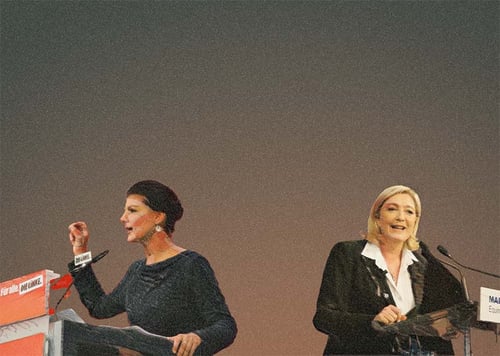
Why Europe's radicals – left and right – align on Russia
If you were asked which parties have the most opposing views at home, the obvious answer would be the far right and the far left. But Russia's war in Ukraine and debates on European defence expose a surprisingly similar aspect in their foreign policies: a leniency towards Russia at best, and an openly pro-Russian stance (at least by certain party exponents) at worst.
Opposed yet aligned
Since Russia invaded Ukraine, Europe's radical parties have shown a reluctance to support Ukraine. Last June, representatives from Germany's far-right Alternative for Germany (AfD) and far-left Bündnis Sahra Wagenknecht (BSW) both refused to attend a speech given by Volodymyr Zelenskiy in the Bundestag, claiming that the Ukrainian president was unnecessarily escalating the war. Both parties, instead, want Germany to cease its military support for Ukraine.
In neighbouring France, far-right National Rally (RN) and radical-left Unbowed France (LFI) have traditionally shown the most resistance to sanctions for Russia and support to Ukraine. The European Parliament's far left and far right also tend to sympathise with Russia, a 2024 study shows.
These moves are regularly interpreted as evidence of pro-Russian sentiments, but Wolfgang Wagner, researcher at Vrije University in Amsterdam, explains it's a bit more complicated than that. ”Although general skepticism towards support for Ukraine can be found at the far right and the far left, the reasoning behind it differs depending on what side of the spectrum you're on,” Wagner says.
Different reasoning
One reason is their radical views on the world order. The far left worries that ordinary people will be drawn into an elite-led conflict and bear the brunt of its consequences. For the far right, the focus is on sovereignty: why get involved in a war that doesn't directly impact your country?
Then, there's the general view of Putin and Russia. For far-left parties, Wagner analyses, this stance is ”mostly driven by anti-Americanism”, where US imperialism (i.e. NATO) is responsible for the invasion, as it provoked Putin into invading Ukraine for security purposes.
Although NATO skepticism can also be found among far right parties, there is a direct proximity with Putin, at times manifesting as outright pro-Russian sentiment. ”Putin represents policies they can identify with, like the 'culture wars' and anti-immigration,” says Wagner. ”He is also perceived as the type of strong leader their current governments lack, and they share his view of foreign policy: great powers do what they want and small powers have to endure this.”
Same outcome
Regardless of the motivations, the outcome remains the same: a perceived ambiguity towards Russia. With most Europeans supporting aid to Ukraine and defence, that's a problem for those seeking power while keeping their current voters content.
Does that mean mainstream parties can win back voters? Not necessarily, for two reasons. While people support Ukraine and defence, their main concerns are what affects them personally. They'd likely agree with increasing defence funding, but not when it comes out of their own pockets.
Then there's political opportunism. ”The ticket to government is to join into the consensus to support Ukraine,” Wagner explains, ”otherwise, you risk conflict with all other Western governments.”
That's exactly what happened in Italy. Prime minister Giorgia Meloni's coalition campaigned on a Eurosceptic platform, but she has since moved her party towards a pro-Ukrainian line – even though her coalition is highly divided on the subject. The question is: will she stick to that line if her European neighbours give in to the radical parties too?